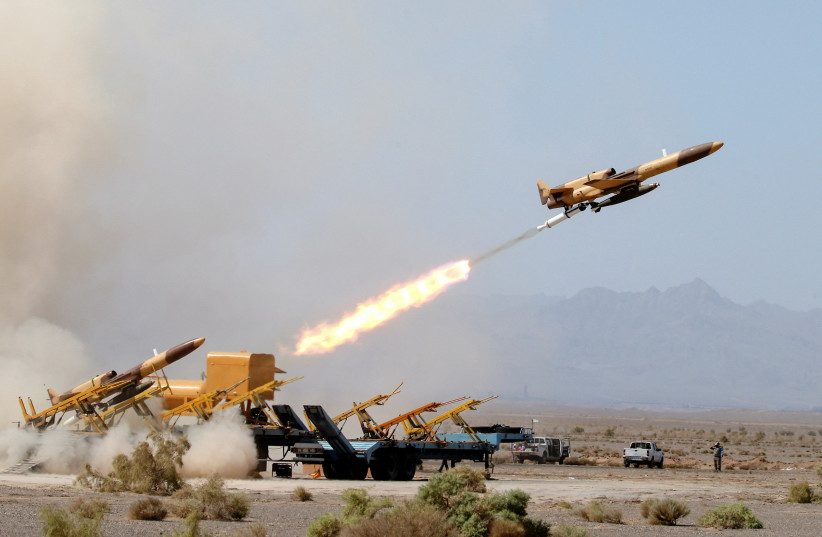Why Europe’s intention to keep missile sanctions on Iran matters – analysis
The EU-3 (France, Germany and the United Kingdom) on Thursday surprised everyone when it exhibited some real toughness in the various standoffs between the West and Iran, according to Reuters.
According to EU officials, the group will maintain sanctions on Iran relating to ballistic missiles beyond the October 18, 2023 expiration date of those sanctions under the 2015 JCPOA Iran nuclear deal.
Effectively, this is the EU telling the Islamic Republic in advance that it will not abide by a key provision of the deal.
This has already angered Tehran and could even impact whether the ongoing talks about an informal understanding with the West or even a return to the JCPOA actually come to fruition.
Why does this matter?
 A drone is launched during a military exercise in an undisclosed location in Iran, in this handout image obtained on August 25, 2022 (credit: IRANIAN ARMY/WANA/REUTERS)
A drone is launched during a military exercise in an undisclosed location in Iran, in this handout image obtained on August 25, 2022 (credit: IRANIAN ARMY/WANA/REUTERS)Iran tested ballistic missiles regardless of sanctions
From one perspective, it does not matter.
The ayatollahs have ignored those aspects of the JCPOA or of UN resolutions prohibiting them from testing ballistic missiles.
Their rationale was basically whereas enrichment of quality and quantity of uranium had clear penalties under the nuclear deal, testing ballistic missiles was merely prohibited, but with no explicit penalty.
In that sense, Iran has been continually progressing its capabilities both to fire conventional ballistic missiles and potentially improving its capability to deliver a nuclear weapon, if it ever decided to fully develop one.
And yet, there could be a variety of intangible impacts.
Despite the Islamic Republic’s violations, it has not had a completely free hand in the ballistic missile arena, with the sanctions having an impact. Continued sanctions could still limit Tehran’s progress in this area.
In addition, the EU could be setting a precedent for ignoring other expiration dates of the JCPOA which Iran cares about, a large one coming up in 2025.
This could allow the EU to continue to hold snap-back sanctions over the head of Iran past the initial 2025 expiration date under the JCPOA.
Possibly, the EU could even extend the snapback threat past the end of the JCPOA in 2030-2031.
The EU’s explanation is that their new position is justified due to: Russia’s use of Iranian drones against Ukraine; the likelihood that Iran might transfer ballistic missiles to Russia; and also to take away from Iran benefits of the nuclear deal, since Tehran has violated the accord (even acknowledging that the US left the accord first.)
Of course, the EU is only one key actor. China and Russia will likely argue that they can now support Iran on any issue related to ballistic missile sanctions.
That support, in terms of sales, logistics or diplomacy, may be enough to allow Iran to present a much greater threat in this area.
It is also possible that the EU is using this as a negotiating ploy to pressure Iran into the not yet finalized new “understanding,” or a return to the JCPOA.
Ultimately, this is only one issue of many where Tehran presents a major threat.
But Israel will be happier to see a bit more strength from the EU than it usually expects and this may even come in handy down the road with the larger JCPOA sanctions expirations in 2025 and 2030-2031.





Comments are closed.